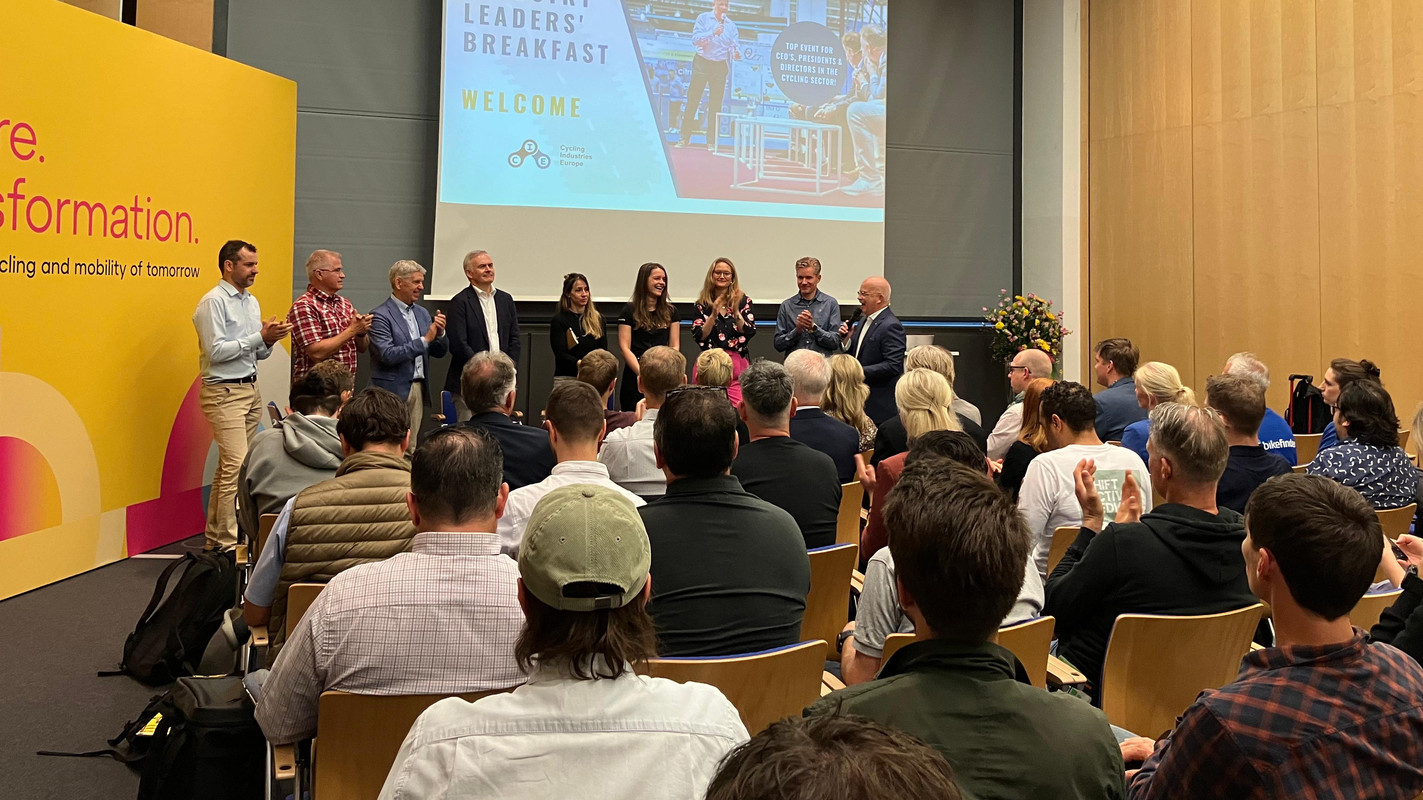Once again, CIE had a packed program at the world’s largest bike expo, Eurobike in Frankfurt. There were lots of encounters, meetings, sessions, and events to attend, but here’s what our team likes to remember from the four days in Frankfurt.
1. Recovery in sight?
After a challenging 2023 it seems like the supply side of the bike sector is building in confidence for later in 2024 and into 2025. It was whispered in the aisles rather than shouted out loud because there are still many companies struggling with excess of inventory in-house or at their customers as a legacy of the over-ordering that took place as supply chains began to fill in 2022 and early 2023. After market service companies, digital suppliers and new entrants are even more ambitious because they are not held back by cash tied up in stock. This was reflected in our Eurobike event programme with packed rooms coming together to talk about Leadership, Digitalisation and Sustainability, all subjects requiring investment for the future.
This matches the findings of CIE’s Market Intelligence Expert Group and our annual Business Health-check that have been in place since the pandemic. Cycle use remains well above pre-pandemic levels in many countries and infrastructure is still being built. As those bikes are being used the after market is maintained and we expect many of those bikes to start being replaced 3-4 years after they were bought, restoring the replacement market alongside new bike sales.
2. Cargo bikes: the good vibes continue
As part of Eurobike’s “Cargo Academy”, CIE presented data from its 2024 European Cargo Bike Manufacturers Survey, and as in previous years, the cargo bike sector continues to grow and show signs of strength. In a year when the broader cycling industry has seen significant challenge, the cargo bike segment proves welcome reading: the survey highlights growth among participants at 2.7 percent, with sales for the 2022-2023 period at approximately 115,000 units. Respondents to the survey also painted a positive picture in regard to employment within the segment, with 33 FTEs on average per respondent (for 2022’s survey, this figure was at 26).
Survey respondents also highlighted that the key markets for sales were Germany, Netherlands and Belgium. Importantly, in two of these countries (Germany and Belgium), bike leasing is a strong and growing sector of financial services. Indeed, in a recent study by Deloitte (commissioned by Zukunft Fahrrad), 37 percent of the country’s employees work in a company that offers bike leasing schemes. This adds to the growing evidence that access to more expensive bikes such as cargo bikes can be improved through such schemes.
For further details and the full report (free for CIE members), contact Sam Pierce s.pierce(at)cyclingindustries.
3. Collaboration: from conversation to action
Several panel sessions and workshops were driven by cycling’s newfound place as a player in EU industrial policy discussions, and recurring conclusions emerged: acting in a united and collaborative manner is the way forward on industrial policy engagement with the EU.
This is certainly not news for Cycling Industries Europe: speaking with one voice on behalf of the industry is what we have always done. But the conversations we have with the European institutions and government around Europe lead to action on the ground, and we now see that cycling companies in Europe and beyond are biting the bullet. Competition in markets can remain highly competitive even if companies team up when it comes to addressing the political picture and ‘making the pie bigger for everyone’.
This was visible for example in ‘how to’ workshops on industrial cluster development and industrial digitalisation. Collaboration between companies and associations is being increasingly viewed as a ‘must-have’ rather than a ‘nice-to-have’ especially now that an increasing array of concrete cases for collaboration are emerging.
4. Women In Cycling – expanding geographically and thematically
Women In Cycling breakfast at Eurobike was bigger than ever reaching more than 200 participants gathered for a networking session to exchange and share ideas, success stories, and the challenges to empower women to gain increased visibility and influence in the cycling industry. This is a welcome development, considering that just five years ago at Eurobike's Leaders Breakfast, only four women were present.
Women in Cycling is expanding also geographically and thematically: national WIC platforms have taken shape in France, Germany and Switzerland. WIC group for mountain biking was kicked off at the IMBA Summit in May and new ideas such as WIC for cargo bikes, and a global WIC are already being discussed.
Women In Cycling LinkedIn Group aimed at embracing networking and exchanging ideas, jobs, recent research or anything that can empower women working in the sector has now more than 2,600 members. WIC Expertise portal was created to enable finding and contacting women for panels, board places, jobs, mentoring or just for a chat and has now more than 500 profiles.
If you want to get involved, join us at future events and Women In Cycling LinkedIn Group, Linkedin Page and Expertise portal!
